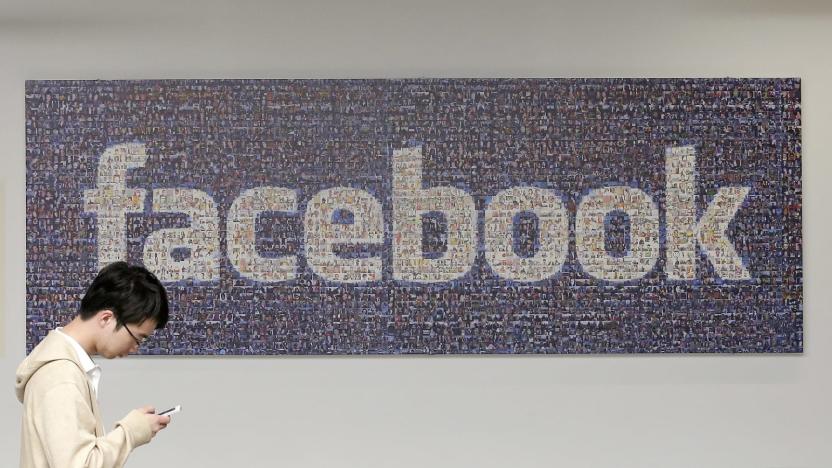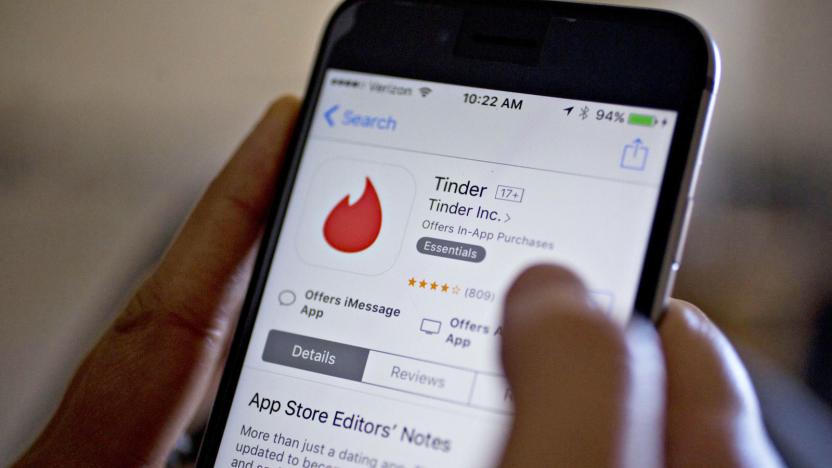termsandconditions
Latest

Facebook will be liable for future Cambridge Analytica-style scandals
Facebook is updating its terms and conditions after agreeing several changes with the EU. It will have to clearly explain to users they can access the social network for free because it uses targeted ads that rely on user data. Facebook will also have to disclose what revenues it generates through the use of such data.

Norway complaint changed the way Tinder uses your swipes
If you actually read the terms and conditions or end-user license agreement before you click the "agree" button, raise your hand. Okay, stop being funny, we know that you actually didn't and you aren't going to score any brownie points with us. In Norway, Tinder recently got into trouble over how its terms and conditions are worded, according to regional news publication Dagens Næringsliv (translated).

UK government considers fining providers with confusing T&Cs
Although companies are legally required to list terms and conditions when a customer buys something, they can often be confusing or outright misleading. ISPs and mobile operators are especially guilty of this and a lot of the time consumers ignore them completely. The UK government has decided now is the time to act, so it's launched a new consultation to make things simpler for consumers and possibly fine online companies that don't comply.

Actually read the iTunes TOS with this graphic adaptation
It's a little lie you tell every single time you sign up for anything on the internet. "I have read and agree to the terms of service." You haven't read them and everybody knows it, but maybe you should read the iTunes Terms and Conditions, just once. Not for legal reasons of course, or on Apple's website -- that would be boring -- but in R. Sikoryak's 'Unabridged Graphic Adaptation: iTunes Terms and Conditions.' It's exactly what it sounds like: two volumes of unwieldy legal jargon juxtaposed with gorgeous comic imagery.

UK politicians want social networks to explain their terms more clearly
If you've never read the terms and conditions for services like Facebook and Twitter, we can hardly blame you. They're often too long and use confusing jargon to describe their practices. The UK's Science and Technology Select Committee wants something to be done about it, and is now calling for simpler disclosures that explain how your personal data is being used. In its report, the committee says too many terms and conditions are written strictly to tick the necessary legal boxes. The average user skips past them and is then shocked when psychological experiments and other shady practices come to light.

Apple updates T & C, includes terms for demo licensing
Today, along with the update of iTunes, there was a really interesting update to the Terms and Conditions. You can check out the entire set of terms if you like, but here's the good bit: Certain paid In App Subscriptions may offer a free trial period prior to charging your Account. If you decide you do not want to purchase the In App Subscription, turn off auto-renewal in your Account settings during the free trial period. Looking at that bit of the terms, this looks a lot like the door is opening to allow what some have held up as the Holy Grail of App Store features: free trials. This is going to be a VERY big deal for people who are already having to maintain a free version of an app separately from the paid version, or have to try to sell people on the in-app purchases. We haven't seen any of these yet, but hopefully this is an option available to developers that will start being utilized immediately.

iBooks Author gets new EULA, aims to clear writer's block
We've waxed lyrical about iBooks Author at the technological level, but a good self-publishing platform counts for nothing if authors are put off by its terms and conditions. A particular source of antagonism so far has been the notion that, if an author decides to charge a fee for their iBook, then Apple will claim exclusive distribution rights and prevent them from publishing their work anywhere else. Check out the More Coverage links below and you'll see that a number of writers tore up Apple's licensing agreement and flung it into the proverbial overflowing trash can. Now though, Cupertino has done some re-writing of its own and come up with a new EULA. It clarifies that Apple will only demand exclusive distribution rights over .ibooks files that are created with iBooks Author, rather than the book's content itself. It states that "this restriction will not apply to the content of the work when distributed in [another] form." So, there it is -- writers everywhere can happily go back to tearing up their own work again.

Windows Store fine print puts consumers first
Digging into the Windows Store fine print reveals Microsoft's "consumer first" policy for the metro-style apps for next year's operating system. The company wants developers to make every app fully touch compatible, with every gesture working the same way as it does in Windows 8. It'll have to cater for every CPU architecture as well (or face having to tailor multiple editions) since users can install it on up to five machines. Video downloads are capped at 256Kb/s and audio at 64Kb/s to prevent apps maxing out the data caps on your plan -- if it wants any more, it'll have to politely ask for your permission. The only thing the company isn't offering to users is a returns policy, (except in countries where it's legally obligated to) but we can't have it all our own way, eh?

Updated terms specify number of installs from the Mac App Store
While researching the reduced price behind Apple's Remote Desktop -- $79.99 on the Mac App Store versus $299.99 for up to 10 seats through Apple's website -- we in the TUAW newsroom found ourselves debating the number of allowed installs. I perused the individual license attached to the Apple Remote Desktop app on the Mac App Store, and it said the app can be installed on computers you own or control in accordance with with the Mac App Store Product Usage Rules. These rules (which weren't on Apple legal's site as of yet, but you do see them when doing your first purchase in the Mac App Store) specify that "You may download and use an application from the Mac App Store for personal, non-commercial use on any Apple-branded products running Mac OS X that you own or control." So that shiny copy of Remote Desktop you just downloaded? It goes to any personal Mac you own. Granted, most people aren't going to own a plethora of Macs, but it's still a better deal than $299.99 just to even use the product. Same goes for Aperture, which is $79.99 on the Mac App Store, but $199.99 through the website. Commercial enterprises will still need to buy individual licenses. It answers a concern about whether or not Apple will restrict the number of installs you can do on the Mac. Likewise, iOS apps downloaded through the iOS App Store can be installed on any Apple-branded products running iOS.

TiVo Premiere now free on contract for $20 monthly, as TiVo introduces (and enforces) tiered subsidies
Well, it seems we finally know why TiVo was waxing poetic about software in recent months -- it's the way the company primarily plans to charge for its DVR hardware from now on. Following a week-long experiment of free-on-contract DVRs conducted last month, TiVo's opening up subsidized and partially subsidized pricing tiers to the entire US for those willing to chain themselves to a pricier $20 monthly fee. You can now get a TiVo Premiere for $0 on a two-year contract or $100 with a one-year arrangement, or pick up a TiVo Premiere XL for $300 on a one-year deal -- the same price the regular old 45-hour TiVo Premiere cost originally. TiVo's also kept the original $12.95-a-month plans around in case you want to pay full price for your hardware, which would normally make better financial sense after about three years, if not for the fact that there are still lifetime subscriptions available for $400 if you're truly in it for the long haul. We're all for expanding our buying power in this arena, but there's one group of customers who are liable to get mighty pissed at the new arrangement -- the regular Joes and Janes headed to Best Buy right now to pick up a $99 TiVo Premiere "on sale." You see, retailers apparently didn't get the memo about the new tiered pricing and are advertising the arrangement as a $200 discount instead, which leaves TiVo's fine print the unenviable role of explaining that they're going to pony up $20 a month from now on. 2.1.2 When purchasing a TiVo Premiere box from a third party retailer at $99.99 (includes an instant $200 savings off MSRP) for the TiVo Premiere box or $299.99 (includes an instant $200 savings off MSRP) for the TiVo Premiere XL box, you may only subscribe to the TiVo Service on a monthly basis for $19.99 a month with a one (1) year commitment (renews monthly after one year). Choices, choices. [Thanks, Daniel and Chris R.]

New terms and conditions for iTunes Store now online
You'll probably see these as soon as you try to update an app or make a new purchase (along with a "This content may not be appropriate for children under 17" warning for some apps). We haven't gone through all the new terms with a fine-tooth comb yet, but it is important to note the following:items purchased IN an app (like new levels, dresses for virtual dogs, map packs, etc.) may not transfer among devices; our developer friends tell us they are absolutely supposed to transfer, but the effort to make that work is on the individual developer and Apple is simply doing a CYA here in the terms. If you have 2 iPhones with the same iTunes account, you can have the same app on both devices -- but you won't be able to reuse anything purchased in one instance of the app onto the other iPhone, nor are you guaranteed to be able to get all your In App content back if you replace your iPhone.Also, note that "The Application Provider is solely responsible for In App Purchases." So if Stinky the chihuahua's sweater never makes it into your device, you'll need to hit up the guys who wrote the app for some refund or re-download or... something. It's not 100% clear on how all that will work, since we have yet to get our grubby, unwashed masses' mitts on the system, but Apple is reportedly leaning hard on developers to make sure In App purchasing works as advertised -- while making sure we all acknowledge who's responsible if something goes awry.If you notice other changes in the T&C, leave 'em in the comments.

3 year warranty with Higher Ed. purchases, or not?
A few weeks ago, Apple stuck a message up on their Higher Education store (EU only) stating that due to a new national agreement for Higher Education individual purchases, any Macs purchased from the store would receive three years of parts and labor coverage at no extra cost. When I later purchased a MacBook from the HE store, I was so excited to be picking up a new Mac as to not notice that the sign had disappeared. I was reassured later on by several people in the support forums who showed me this extract from the HE Store's Terms and Conditions (no, not this one! Yes, there are two T&Cs *sigh*):"10.1.1 All Apple-branded desktop and portable computer products shall be subject to a 36 calendar month warranty period commencing from the date of delivery."When I received my MacBook, I checked the included booklet regarding my warranty: the above clause is nowhere to be seen. Instead the booklet talks exclusively about my one year limited warranty with no mention of Higher Education or extended warranties. Likewise, when I use Apple's tool to check how much AppleCare you have remaining, it returns a result of 356 days. Apple has confused me even further by allowing people who have purchased new Macs from the HE Store to purchase 3 year telephone coverage for around £50. When I bought my MacBook, there wasn't even an option to purchase AppleCare in the build to order section!I'm not the only one to feel confused. People over at the Apple support forums (1, 2, 3) and the MacRumors.com forums are equally mixed up. So, what's the deal Apple?








